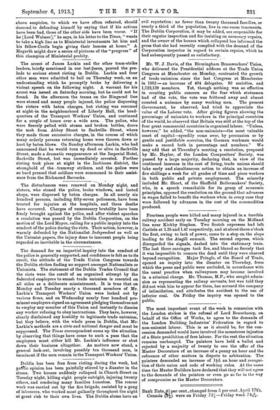Mr. W. J. Davis, of the Birmingham Brassworkers' Union, who
delivered the Presidential address at the Trade Union Congress at Manchester on Monday, contrasted the growth of trade unionism since the last Congress at Manchester in 1882—an increase of 404 delegates, 80 societies, and 1,723,139 members. Yet, though nothing was so effective in creating public concern as the fear which statesmen had of the vote, the vote was frittered away and almost counted a nuisance by many working men. The present Government, he observed, had tried to appreciate the value of the Labour vote. After giving figures showing the percentage of unionists to workers in the principal countries of the world, he observed that Britain was still at the top of the four great commercial countries in organized labour. "Unless, however," be added, "the non-unionists—the most valuable asset of capital—speedily come over, by persuasion or by gentle and justifiable coercion, the German workmen would make a record both in percentage and numbers." We may add that at Thursday's meeting a resolution, proposed by Mr. Naylor, of the London Compositors' Society, was passed by a large majority, declaring that, in view of the continued increase in the cost of living, trade unions should take early- and simultaneous action to obtain an increase of five shillings a week for all grades of time and piece workers in both public and private employment. The minority included Mr. Short, of the Sheffield Boilermakers' Society, who, in a speech remarkable for its grasp of economic principles, opposed the resolution on the ground that advances in wages failed to benefit the workers when in every case they were followed by advances in the cost of the commodities produced.






































 Previous page
Previous page